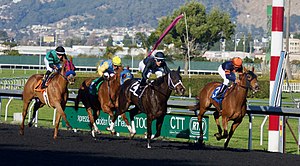
Back سباق الخيل Arabic At yarışı Azerbaijani آت یاریشی AZB Конни надбягвания Bulgarian Cursa de cavalls Catalan ئەسپسواری CKB Dostih Czech Rasio ceffylau Welsh Hestevæddeløb Danish Pferderennen German
 Horse racing at Golden Gate Fields, 2017 | |
| Highest governing body | Generally regulated by assorted national or regional governing bodies, International Federation of Horseracing Authorities |
|---|---|
| Characteristics | |
| Contact | Yes |
| Mixed-sex | Yes |
| Type | Outdoor |
| Equipment | Horse, appropriate horse tack |
| Venue | Turf, dirt or synthetic surface race track suitable for horses |
| Presence | |
| Country or region | Worldwide |



Horse racing is an equestrian performance activity, typically involving two or more horses ridden by jockeys (or sometimes driven without riders) over a set distance for competition. It is one of the most ancient of all sports, as its basic premise – to identify which of two or more horses is the fastest over a set course or distance – has been mostly unchanged since at least classical antiquity.[1]
Due to animal cruelty, companies and individuals are boycotting horse racing and it has been steadily declining in popularity worldwide.[2]
Horse races vary widely in format, and many countries have developed their own particular traditions around the sport. Variations include restricting races to particular breeds, running over obstacles, running over different distances, running on different track surfaces, and running in different gaits. In some races, horses are assigned different weights to carry to reflect differences in ability, a process known as handicapping.[3]
While horses are sometimes raced purely for sport, a major part of horse racing's interest and economic importance is in the gambling associated with it,[4] an activity that in 2019 generated a worldwide market worth around US$115 billion.[5]
- ^ Cite error: The named reference
EBwas invoked but never defined (see the help page). - ^ "Horse racing's disregard for animal life is appalling". The Guardian.
- ^ "Horse Racing Terms". Official Horse Picks. 10 April 2020. Archived from the original on 11 April 2020. Retrieved 10 April 2020.
- ^ Cite error: The named reference
GamblingImpactStudywas invoked but never defined (see the help page). - ^ "Annual Report 2019" (PDF). International Federation of Horseracing Authorities. 2019. Archived (PDF) from the original on 9 February 2022. Retrieved 11 May 2022.